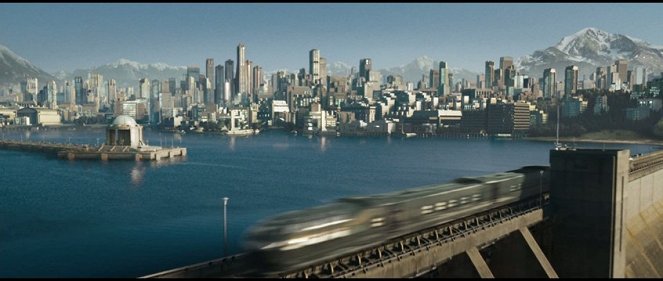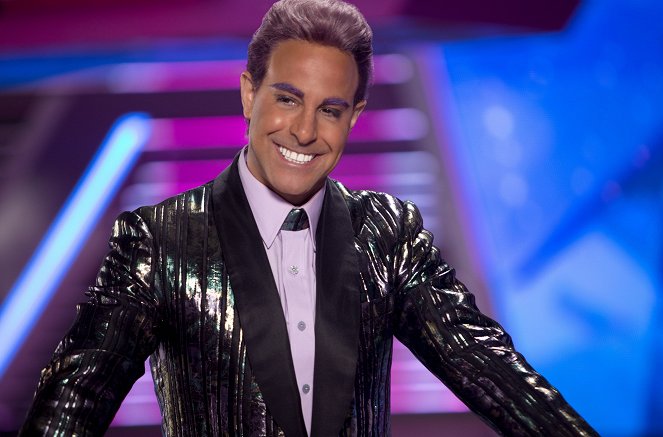Directed by:
Francis LawrenceCinematography:
Jo WillemsComposer:
James Newton HowardCast:
Jennifer Lawrence, Josh Hutcherson, Donald Sutherland, Woody Harrelson, Philip Seymour Hoffman, Jena Malone, Sam Claflin, Jeffrey Wright, Liam Hemsworth (more)Plots(1)
Katniss Everdeen has returned home safe after winning the 74th Annual Hunger Games along with fellow tribute Peeta Mellark. Winning means that they must turn around and leave their family and close friends, embarking on a "Victor's Tour" of the districts. Along the way Katniss senses that a rebellion is simmering, but the Capitol is still very much in control as President Snow prepares the 75th Annual Hunger Games (The Quarter Quell) - a competition that could change Panem forever. (Roadshow Entertainment)
(more)Videos (35)
Reviews (16)
Catching Fire is more mature and bearable than the first installment, which I had to suffer through. It’s too long and
brings no satisfying conclusion (it only compels you to watch the next part), but it’s entertaining enough. It’s not a bad
adventure fun for young audiences, and Francis Lawrence’s directorial craftsmanship shows no flaws. The best part of the movie is the epic scenes à la Cleopatra on the Capitol square.
()
A pleasant surprise. With the arrival of Francis Lawrence and the new screenwriters, the quality of Hunger Games has gone up a step, and suddenly it's an impressive and thrilling spectacle with pretty interesting characters and an ending that will simply make you want to watch the next films. Almost everything I complained about in the first film is better here. Although the plot heavily relies on reliable acting aces (I found the biggest joy from all the space Donald Sutherland got), and even Jennifer Lawrence and her group in the arena aren't bad at all.
()
Better than its predecessor in every way. Instead of a positive shock from something unprecedented and new, there is only pure quality, supported by a juicy budget that brings excellent visual effects, a good dramatic storyline, and fantastic performances, especially from Jennifer Lawrence. It may only serve as a connecting bridge to the next installment, but if the quality continues to rise at this pace, there is nothing to be afraid of. An exceptionally dense and original experience.
()
It’s ridiculous and sad when one reads the reactions to the second instalment of The Hunger Games with a constant stream of disparaging comments because the film is primarily targeted at girls, even though those same people uncritically praise Marvel comic-book movies. In comparison with those, the positive aspects of Catching Fire are readily apparent, dispensing with the prejudices associated with the “chick flick” genre and even showing that, thanks to such books and films, today’s adolescents have much more complex and enriching role models than previous generations. Catching Fire uses the same production concept as top-tier comic-book flicks, so it also has a generous budget, a director who is rather more associated with dramatic titles than with a distinctive creative signature in terms of handling action scenes, and excellent or at least solid actors who give the characters individuality solely through their presence. Whereas in comic-book movies this is a way of humanising half-tone characters who never had more complex character traits but rather represented certain heroic or mythic ideals, here truly ambiguous personalities with far more thoughtful and non-formulaic natures are brought to life. Similarly, whereas comic-book movies draw their sophistication from relating to their own canon, traditional myths and the contemporary socio-political atmosphere, The Hunger Games does not thematise the heroic side of heroism, but its relativity and artificiality, thus revealing that the heroes of today are mere constructs or personalities exploited in the interest of a certain ideology (whether ruling or revolutionary) and then chewed up and spit out by PR specialists and the tabloid press. The heart of The Hunger Games is its central character, Katniss Everdeen, who is not a demigod from another planet, a billionaire dandy or any other kind of privileged pseudo-personality, but an ordinary girl with ambiguous personality traits who came into a world where she is forced to play a certain role. While plans for revolution are cooked up around her and grand speeches about destiny are made, she has her own motivation: an entirely anti-heroic, egocentric effort to ensure that she and her loved ones can get out alive and live their own lives. The conflict between the private and public worlds and between real personalities and marketing constructs form the core of Catching Fire’s narrative, which is strictly defined against the world of superficiality and fleeting glory. That can’t really be said about the stories of privileged heroes living in splendour. Of course, even in The Hunger Games, this criticism is relative and doesn’t reach the harshness or vitriol of biting satires or openly anti-consumerism pamphlets. But that’s not the purpose of the film. Rather, the aim of the film is merely to give young people – not just girls – a positive role model who frees them from the fallacies foisted on them by lifestyle magazines and dully conservatives films and series.
()
(less)
(more)
It’s quite a paradox that the second Hunger Games was accused a priori by critics of being a teenage romance like Twilight, and yet, there’s hardly any romance in it, or rather, there is no more than in any other Hollywood blockbuster. In short, the romantic line between Katniss, Peeta and Hurricane has now been put in the background and serves only for a deeper portray of the characters and the emotional state of the heroes within the reality of a totalitarian system, instead of being the centre of it all. Other than that, it’s pretty brutal dystopian sci-fi. The leaders of the Capitol have turned from funny colourful clowns into unscrupulous totalitarian douchebags worthy of respect. The first half has excellent pace and tells us more about how that world works, while the socio-medio-political line doesn’t feel stupid. The weakest part is the one in the Arena, which needs to have several scenes with more action (up until then it’s mostly a conversational film) and it’s only a slight variation of the events of the first part. I understand why it had to be there, but it was more fun when the heroes were on the victory tour as mediators in the relationship between the oppressed public and the governing class. The ending, on the other hand, comes too suddenly; that which was only said would have probably been better shown in a couple scenes more. In any case, I’m looking forward to the next sequel.
()



Ads